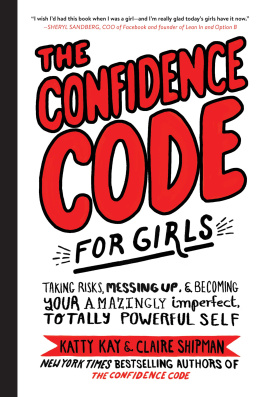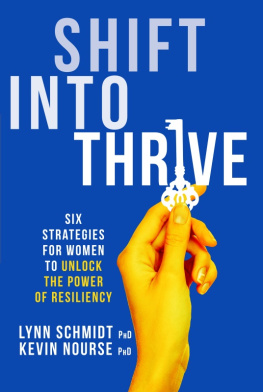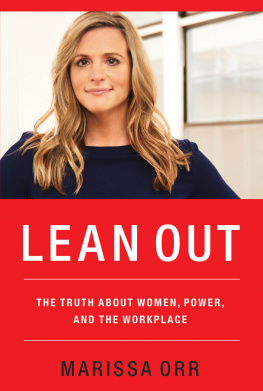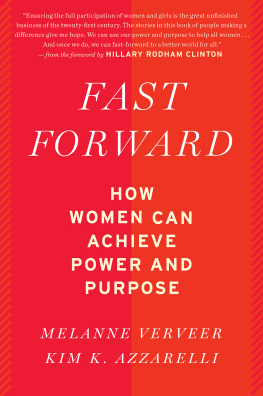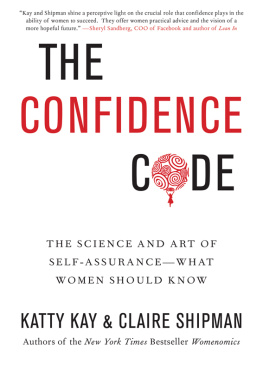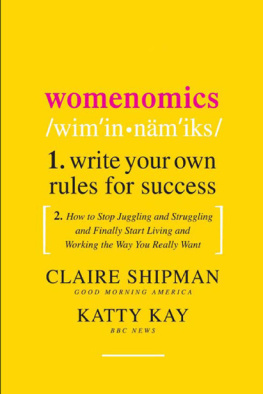For our daughters,
Maya, Poppy, and Della,
and our sons,
Felix, Jude, and Hugo
Contents
There is a quality that sets some people apart. It is hard to define but easy to recognize. With it, you can take on the world; without it, you live stuck at the starting block of your potential.
Theres no question that twenty-eight-year-old Susan had plenty of it. Like many of us, though, she was terrified of public speaking. Susan had a lot to sayshe just didnt like the spotlight. She confessed to friends that she spent many sleepless nights worrying about upcoming performances, fearful of being ridiculed. Her early speaking efforts werent great. But she kept at it. Armed with a sheaf of notes and protected by her sensible dresses, she fought her nerves and delivered her controversial message over and over, often to extremely skeptical male audiences. She knew she had to conquer her fear to do her job well. And she did, becoming a very persuasive public speaker indeed.
Susan B. Anthony, the voice of womens suffrage for the United States, worked for fifty years to win women the right to vote. She died in 1906, fourteen years too soon to see what shed accomplished, but she was never deterredeither by her vulnerabilities, or by the fact that victory was always just out of reach.
Just making the trip to school every day, as a girl in modern-day Pakistan, requires that same quality. And then to imagine, as a twelve-year-old, that you can challenge the Taliban by calling for education reform, blogging to the world as schools are blown up around you, absolutely demands it. And it calls for a huge dose of something remarkable to keep going, to keep fighting for a cause, after being pulled off a bus, shot in the head by extremists, and left for dead at fourteen. Malala Yousafzai has courage, to be sure. When the Taliban announced they intended to kill her she barely seemed to blink, saying: I think of it often and imagine the scene clearly. Even if they come to kill me, I will tell them what they are trying to do is wrong, that education is our basic right.
But shes harnessing something else, too, something that fuels her defiance and charts her steady movement forward. Malala nurtures an extraordinary, almost unimaginable belief that she can succeed, even when the odds are stacked, boulderlike, against her.
A century apart, these two women are united by a common faitha sense that they can achieve what they set out to do. What they share is confidence. Its potent, essential even, and for women, its in alarmingly short supply.
The elusive nature of confidence has intrigued us for years, ever since we started writing Womenomics in 2008. We were busy detailing the positive changes unfolding for women: remarkable data about our value to the bottom line of companies, and the power that gives us to balance our lives and still succeed. But as we talked to women, dozens of them, all accomplished and credentialed, we kept bumping up against a dark spot that we couldnt quite identify, a force clearly holding us back. Why did the successful investment banker mention to us that she didnt really deserve the big promotion shed just got? What did it mean when the fast-rising engineer, whod been a pioneering woman in her industry for decades, told us offhandedly that she wasnt sure she was really the best choice to run her firms new big project?
In two decades of covering American politics, we have interviewed some of the most influential women in the nation. In our jobs and our lives, we walk among people who youd assume would brim with confidence. On closer inspection, however, with our new focus, we were surprised to realize the full extent to which the power centers of this nation are zones of female self-doubt. Woman after woman, from lawmakers to CEOs, expressed to us some version of the same inexplicable feeling that they dont fully own their right to rule the top. Too many of the fantastically capable women we met and spoke with seemed to lack a certain boldness, a firm faith in their abilities. And for some powerful women, we discovered, the very subject is uncomfortable, because it might reveal what they believe to be an embarrassing weakness. If they are feeling all that, only imagine what it is like for the rest of us.
You know those uneasy sensations: the fear that if you speak out you will sound either stupid or self-aggrandizing; the sense that your success is unexpected and undeserved; the anxiety you have about leaving your comfort zone to try something exciting and hard and possibly risky.
We have often felt the same kind of hesitation ourselves. Comparing notes about confidence levels at the end of a dinner a few years ago, as well as we knew each other, was a revelation. Katty went to a top university, got a good degree, speaks several languages, and yet she has spent her life convinced she just isnt intelligent enough to compete for the most prestigious jobs in journalism. Claire found that implausible, laughable really, and yet realized that she too, for years, routinely deferred to the alpha-male journalists around her, assuming that because they were so much louder, so much more certain, that they just knew more. She almost unconsciously believed that they had a right to talk more on television. Were they really just more self-assured?
The questions kept coming. Had we merely stumbled across a few anecdotes here and there, or are women really less confident than men? And what is confidence, anyway? What does it let us do? How critical is it to our well-being? To success? Are we born with it? Can we get more of it? Are we creating it or thwarting it in our kids? Finding answers to these questions was clearly our next project.
We covered more territory than we initially envisioned, because each interview and each answer convinced us that confidence is not only an essential life ingredient, but also unexpectedly complex. We met with scientists who study the way confidence manifests itself in lab rats and monkeys. We talked to neurologists who suggested that it is rooted in our DNA, and psychologists who told us it is the product of the choices we make. We talked to coaches, of performance and sports, who told us it comes from hard work and practice. We tracked down women who clearly have it, and women who dont so much, to get their take. And we talked to menbosses, friends, and spouses. Much of what we found is relevant for both sexes; our genetic blueprints arent wildly different when it comes to confidence. But there is a particular crisis for women.
For years, we women have kept our heads down and played by the rules. We have made undeniable progress. Yet we still havent reached the heights we know we are capable of scaling. Some misguided bigots suggest women arent competent. (Personally, we havent found many incompetent women.) Others say children change our priorities, and, yes, there is some truth in this claim. Our maternal instincts do indeed create a complicated emotional tug between our home and work lives that, at least for now, just doesnt exist as fiercely for most men. Many commentators point to cultural and institutional barriers aligned against us. Theres truth in that, too, but all of these reasons are missing something more profoundour lack of self-belief.
We see it everywhere: Bright women with ideas to contribute who dont raise their hands in meetings. Passionate women who would make excellent leaders, but dont feel comfortable asking for votes or raising campaign money. Conscientious mothers whod rather someone else become president of the PTA while they work behind the scenes. Why is it that women sound less sure of ourselves when we know we are right than men sound when they think they could be wrong?


